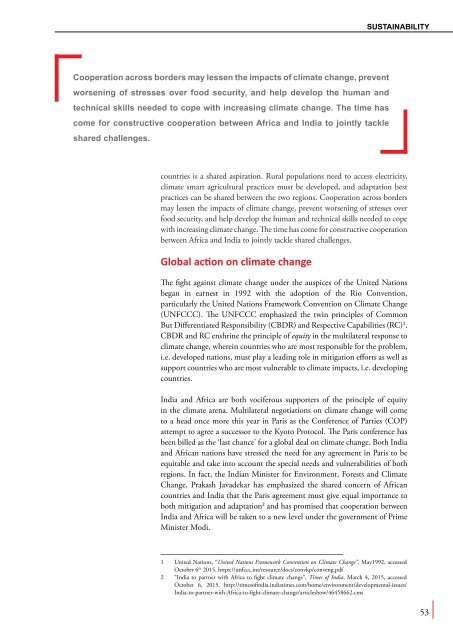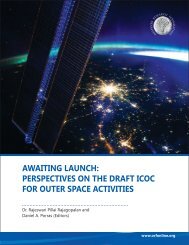Common Futures
II3UUw
II3UUw
You also want an ePaper? Increase the reach of your titles
YUMPU automatically turns print PDFs into web optimized ePapers that Google loves.
Sustainability<br />
Cooperation across borders may lessen the impacts of climate change, prevent<br />
worsening of stresses over food security, and help develop the human and<br />
technical skills needed to cope with increasing climate change. The time has<br />
come for constructive cooperation between Africa and India to jointly tackle<br />
shared challenges.<br />
countries is a shared aspiration. Rural populations need to access electricity,<br />
climate smart agricultural practices must be developed, and adaptation best<br />
practices can be shared between the two regions. Cooperation across borders<br />
may lessen the impacts of climate change, prevent worsening of stresses over<br />
food security, and help develop the human and technical skills needed to cope<br />
with increasing climate change. The time has come for constructive cooperation<br />
between Africa and India to jointly tackle shared challenges.<br />
Global action on climate change<br />
The fight against climate change under the auspices of the United Nations<br />
began in earnest in 1992 with the adoption of the Rio Convention,<br />
particularly the United Nations Framework Convention on Climate Change<br />
(UNFCCC). The UNFCCC emphasized the twin principles of <strong>Common</strong><br />
But Differentiated Responsibility (CBDR) and Respective Capabilities (RC) 1 .<br />
CBDR and RC enshrine the principle of equity in the multilateral response to<br />
climate change, wherein countries who are most responsible for the problem,<br />
i.e. developed nations, must play a leading role in mitigation efforts as well as<br />
support countries who are most vulnerable to climate impacts, i.e. developing<br />
countries.<br />
India and Africa are both vociferous supporters of the principle of equity<br />
in the climate arena. Multilateral negotiations on climate change will come<br />
to a head once more this year in Paris as the Conference of Parties (COP)<br />
attempt to agree a successor to the Kyoto Protocol. The Paris conference has<br />
been billed as the ‘last chance’ for a global deal on climate change. Both India<br />
and African nations have stressed the need for any agreement in Paris to be<br />
equitable and take into account the special needs and vulnerabilities of both<br />
regions. In fact, the Indian Minister for Environment, Forests and Climate<br />
Change, Prakash Javadekar has emphasized the shared concern of African<br />
countries and India that the Paris agreement must give equal importance to<br />
both mitigation and adaptation 2 and has promised that cooperation between<br />
India and Africa will be taken to a new level under the government of Prime<br />
Minister Modi.<br />
1 United Nations, “United Nations Framework Convention on Climate Change”, May1992, accessed<br />
October 6 th 2015, https://unfccc.int/resource/docs/convkp/conveng.pdf<br />
2 “India to partner with Africa to fight climate change”, Times of India, March 4, 2015, accessed<br />
October 6, 2015. http://timesofindia.indiatimes.com/home/environment/developmental-issues/<br />
India-to-partner-with-Africa-to-fight-climate-change/articleshow/46458662.cms<br />
53








